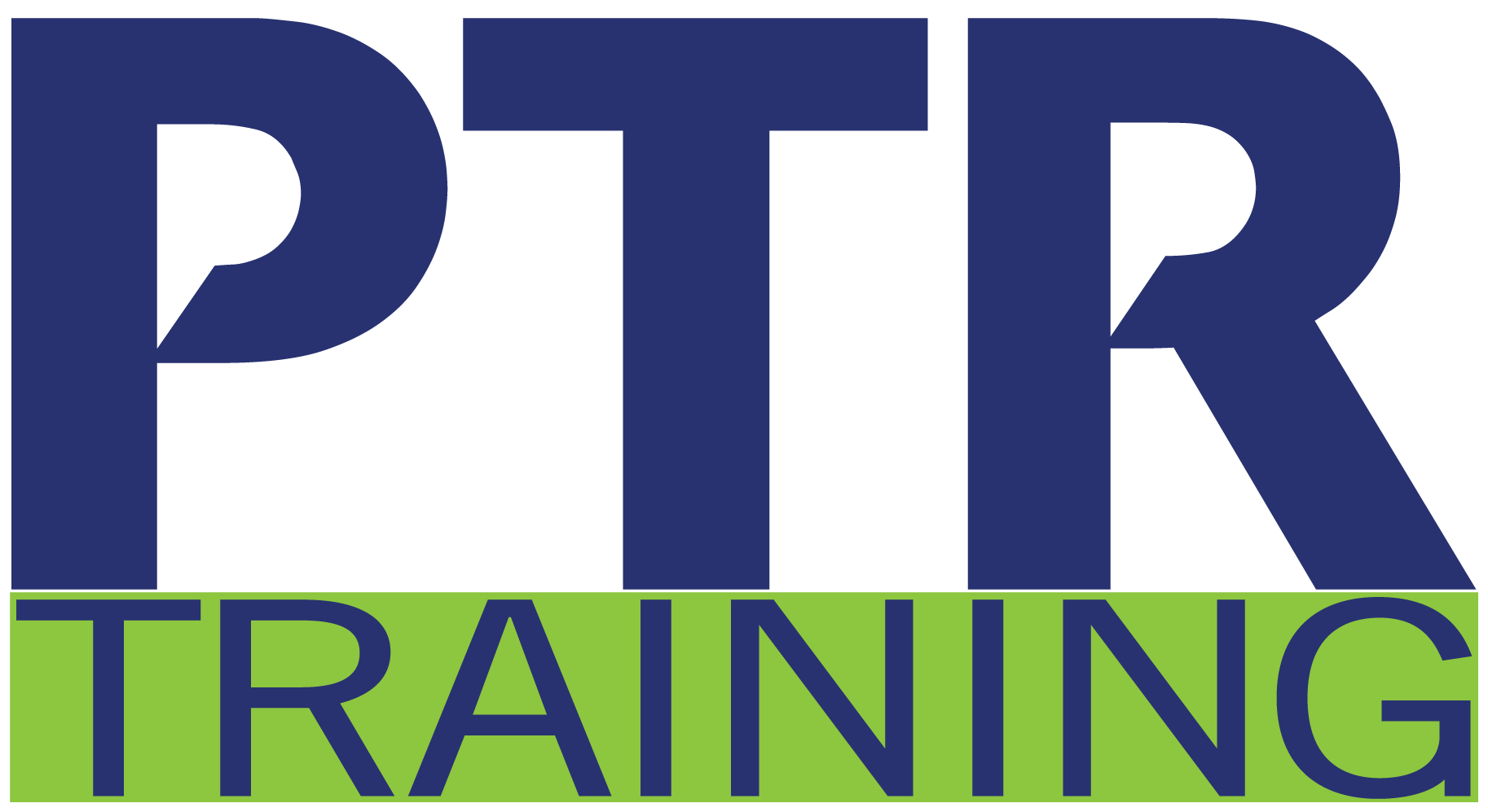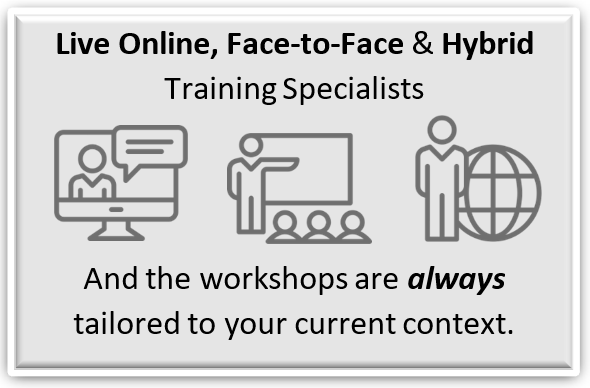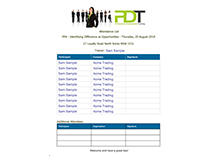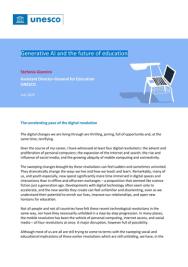- Open training
- Team training

Critical Thinking and Problem Solving for Effective Decision-Making
Professional development and personal effectiveness.
An essential competency in today’s workplace
Mastering critical thinking and problem-solving skills can help you make better decisions or recommendations- an essential competency in today’s knowledge workplaces. Critical thinking helps you to examine and improve thought processes, ask the right questions, challenge assumptions and consider varying viewpoints. Effective problem-solving helps you to properly identify and systematically work through a problem in a comprehensive manner, ensuring clarity when it comes time to make decisions or recommendations.
This course will demonstrate how critical thinking, problem-solving and decision-making work optimally together, and will provide hands-on practice with tools that you can apply to your everyday workday tasks, big or small.
Learning outcomes
By the end of this seminar, you will be able to:
- Define critical thinking and identify your critical thinking styles
- Work through the critical thinking process to build, analyze and evaluate varying viewpoints
- Improve key critical thinking skills, including active listening and questioning
- Analyze context and information to clearly understand and identify a problem
- Apply problem solving steps and tools
- Identify appropriate solutions using specific approaches
- Select the best technique for making decisions
- Avoid common decision-making mistakes
Workshop topics
Maximizing the Power of Your Brain
- Critical thinking and problem-solving the key to effective decision making
- The Iceberg Principle and the Understanding-Resolution Ration
Critical Thinking
- Definition of a Critical Thinker
- Critical thinking behaviours: active listening, probing, Empty Your Bucket
- Identify and evaluate issues and viewpoints
- The 3 C’s: context, credibility, and consistency
- Critical thinking worksheet- practice it!
- Problem Solving
- The problem-solving process- various models
- Obstacles and counterproductive approaches
- Problem-solving techniques for groups and individuals
- Applying a problem-solving model to a workplace scenario
Decision Making
- Individual and collective decision-making traps
- How to choose: criteria, goals and vision-based decision-making
- Individual and group decision-making tools and techniques
- Decision-making – practical application to a workplace scenario
Prerequisites
There are no prerequisites for this course
Who should attend this course?
Anyone who is required to problem solve on the job or make important project, department or organizational decisions or recommendations
Does this course address your competency development needs?
This workshop addresses:
- Achievement / Results Oriented
- Adaptability / Flexibility
- Analytical Thinking
- Change Management / Leadership
- Creative Thinking
- Decision Making / Decisiveness
- Engagement and Motivation
- Impact / Influence
- Innovation and Initiative
- Self Confidence / Self Esteem
- Strategic Thinking
- Teamwork and Cooperation
- Working with Others
To learn more about core competencies, click here .
$ 595 plus tax
Choose my session
- Instructor: Barbara Odenwald
The advantages of team sessions
- Learn and grow together as a team
- Location and time of your choice
- Sessions can be customized to fit your objectives
- Surprisingly cost effective
Submit your interest
Questions? Let us help
Our clients, welcome to our new website.
We appreciate your patience as we add the finishing touches. In the meantime, go and explore!
Cookie Usage Disclaimer: This website uses cookies to enhance your browsing experience. By continuing to use this site, you consent to our use of cookies. For more information, please review our Privacy Policy .
Hello! We'd love to hear from you!
Complete the form below or reach us at: [email protected] , or 613-234-2020
Contact details
To help you.
- I wish to subscribe to PMC Training content.

- About Guthrie-Jensen
- Our Technology
- Public Seminars
- Public Seminar Schedules
- Customized In-House Training
- Live Virtual Training
- International Participants
- Facilitation + Assessments
- INSIGHTS: Latest Articles
Training + Services
Problem solving and decision making.
Leadership is about taking control of situations that arise. They may be problems, threats or opportunities. Which is which?

Learn about the nature of problem-solving and patterns of thinking, assess your options, make rational choices and address potential threats.
Become a more decisive leader. With Guthrie-Jensen’s Problem Solving and Decision Making , you will:
- Face problems and make decisions with renewed confidence
- Reinforce your authority and credibility with proven problem solving and decision making techniques
- Analyze situations more comprehensively to arrive at the best solution
- Anticipate potential problems, assess risks, and weigh alternatives to come up with the best decisions
- Tackle problems more systematically and logically
- Harness support mechanisms that will give rise to better solutions and decisions
- Communicate decisions to team members to reinforce your power, authority and credibility
- Consistently implement and follow-through on decisions
- Overcome obstacles and resistance to “unpopular” decisions
Available as In-Person and Live Virtual Training
- Public Seminar (check latest schedules now!)
- In-House/Customized Program for your organization (How does Guthrie-Jensen customize its programs?)

This program is for supervisors and managers who wish to improve their problem solving and decision making skills.
Testimonials
“I found this training very relevant and practical for the workplace and personal life. I highly recommend this training for others who wish for self development.” Chamroen Ouch – Asian Development Bank “If there is a definition of excellence it is this. Master trainers, outstanding management wizards and a learning experience that truly moves beyond learning to action. Truly enriching, and enlightening.” Sujatha Viswanathan – Sr. Social Officer, Asian Development Bank “Very useful and easy to relate methodologies for ‘Critical Thinking, Problem Solving and Decision Making’.” Francis Emmanuel – Sr. Financial Control Spec., Asian Development Bank “Of all seminars I’ve gone, this is the best seminar ever. The training was not just on theories but it is more on its application in real situations. I thank Guthrie-Jensen for such a great experience. I would surely put to practice what I’ve learned from you.” Don Ysmael Solijon – Process & Eng’g Services, Atlas Fertilizer Corporation “Spectacular approach. Very useful and practical lecture approach/methodology. Excellent facilitator.” Alex Carbilledo – Asst. Manager, Fujitsu Computer Products Corporation of the Philippines
- Administrative Support
- Business and Organizational Development
- Communication
- Customer Service
- Leadership / Management
- Operational Excellence
- Administrative Support (In-House Programs)
- Business and Organizational Development (In-House Programs)
- Communication (In-House Programs)
- Customer Service (In-House Programs)
- Leadership / Management (In-House Programs)
- Operational Excellence (In-House Programs)
- Sales (In-House Programs)
- Talent Development
- Training Program Finder
Experience the Guthrie-Jensen Advantage today.
Inquire Now
Guthrie-Jensen Consultants, Inc. 4/F ACE Building, 101-103 Rada corner Dela Rosa Streets Legaspi Village, Makati City
Office Hours: 8:00AM to 4:30PM (Manila Time)
Follow us on Facebook for additional updates.
Get in Touch
Email: [email protected]
Telephone: (+632) 8816-1610 (+632) 8816-0289 (+632) 8818-5853 (+632) 8892-7559 (+632) 8892-5294
Fax: (+632) 8812-8114
Civil Service Commission Accredited Training Institution (ATI) (for government employees)
Privacy Policy | Terms of Use | Sitemap
© 2017 Guthrie Jensen Consultants. All Rights Reserved. Website by Intuitiv Solutions
Zoe Talent Solutions
Creative problem solving and decision making training.

Course Overview
- Course Outline
Book Classes Now
Are you struggling to take prompt decisions? Do you get bogged down whenever you face an issue at workplace or personal life? Do you get stressed or nervous attack? Do you regret that some of your past decisions were wrong?
Do you find that your colleagues end up making mistakes at work which could have avoided? Do you struggle convincing your ideas / decisions to others?
Wait, What if we tell you that all these are just symptoms of a problem that can be easily solved? Well, the problem is that you are yet to understand the best practices, theories and the scientific methods for “Creative problem solving and decision making”. By learning this course, you will realise your potentials in faster and effective decision making – both individual and organisational.
Also Explore Other Courses
- Mentoring Skills Course
- Leading High Performance Teams Course
- Developing Leadership Presence Training
- Executive Presentation Skills Training
- Situational Leadership Training Course
Through this Creative Problem Solving and Decision Making Training Course offered by Zoe Talent Solutions, you will learn how to develop new ways to solving problems. This program will help you to create a renewed and an unconventional perception towards your day to day tasks and work.
You will learn scientific and proven methods which are being used by thousands of successful organisations and management practitioners/ leaders in becoming better decision makers. This course not just gives the methods but also helps you in practicing the same and evolve as a creative problem solver.
Course Object ives
Upon completing this creative problem solving and decision making course, you will be able to:
- Learn and apply appropriate problem solving and decision making processes and methods
- Identify common challenges / biases to effective problem solving and decision making
- Assess conceptual blocks and significant situational challenges which lead to bad decisions
- Apply these learnings to enhance leadership development and organizational performance
- Learn different types of thinking – Critical thinking / Divergent thinking / Convergent thinking and use it for effective problem solving
Training Methodology
We at Zoe Talent Solutions offer to customize our training course to suit the requirements based on your professional background. Our trainers will ensure that the training is in line with your organisational and work objectives. The course will be interactive and participation is highly encouraged.
You will have group discussions, group activities, case studies, and other methods of course facilitation. Participants across different organisations will share their best practices during the training program. Zoe Talent Solutions’ courses follow the Do–Review–Learn–Apply Model of training.
Organisat ion Benefit
Organisations employees taking up this Creative Problem Solving and Decision Making Training course will benefit in the following ways:
- Tap the employee potential in making better and faster decisions
- Eliminate unconscious biases that could hamper organisational values
- Obtain creative ideas that help in organisational development
- Increased productivity due to faster problem solving
- Solving the core issues / root issues than superficial fixes
- Develop a mind-set of continuous learning and development and looking at problems as a chance for intellectual stimulation.
- Employees with creative problem solving skills look at problems as opportunities
- Better Team building and morale due to effective problem solving
Personal Benefits
Individuals attending the Creative problem solving program will have the below advantages:
- Knowledge of creative problem solving methods helps in better interpersonal relations
- Ability to handle workplace stresses / issues more creatively/ objectively
- Develop better analytical skills in problem-solving
- Have better leadership capabilities by tapping the potentials of team member
- Learn faster decision making which is a key for future success
- Grow up in career ladder with better decision making skills – an important skillset for leadership
- Creative Problem Solving differentiates a good boss / bad boss
- Learn how to apply these techniques in personal / organisational problems
Who Should At t end
Individuals at all levels looking to become more efficient, confident, and productive in the corporate world and in their personal lives must attend this program.
Business intellectuals, policymakers, trend-setters, organisers, top management, managers, supervisors, project managers and executives would require these practical sessions to improve their problem solving skills. This program is a must attend for those aspiring for any leadership role.
Course Out line
This training program will cover the following modules which are essential in understanding the key skills of Creative Problem Solving and Decision Making:
Training Modules
Module 1 – Why is Creative Problem Solving needed?
- Changing Business Contexts – The VUCA world
- Creative Problem Solving + Faster Decisions = Better Profits
- Examples of Ideas that disrupted the world
- Is Creative problem solving a Skill?
- Role of a Manager / Leader in Problem Solving
Module 2 – What is a Problem ?
- Defining “The Problem”
- Are all “problems” really a “problem”?
- Is the problem a cause or symptom ?
- Defining “Decision Making”
- Are all “Decisions” really a “decision?”
- Do we “ need “to solve problem?
- Is your decision congruent to the personal / organisational values / ethics?
Module 3 – Block Busting Problems (James Adams)
- The Perceptual Block
- The Emotional Block
- Cultural & Environmental Blocks
- Intellectual and Expressive Blocks
- Stereotyping and Unconscious Biases
- Blockbusting solutions
Module 4 : Creative Problem solving and Decision Making – The Process
- Kepner Tregoe Rational Process
- Situation Appraisal
- Problem Analysis
- Decision Analysis
- Potential Problem / Opportunity Analysis
Module 5: Critical Thinking
- Thinking Fast and slow – Eliminating Unconscious Bias (Daniel Kanhemann’s Book review)
- The 8 Elements of The Critical Thinking Process (Reflection, Analysis, Acquisition of information, Creativity, Structuring arguments, Decision making, Commitment, Debate.
- 6 Stages of Development in Critical thinking (Linda Paul & Richard Elder Model)
- The Unreflective Thinker
- The Challenged Thinker
- The Beginning Thinker
- The Practicing Thinker
- The Advanced Thinker
- The Accomplished Thinker
Module 6 : Convergent & Divergent Thinking
- Characteristics of Convergent and Divergent thinking
- Steps in Convergent Thinking
- Steps in Divergent thinking
- Examples and practice sessions in Convergent and Divergent Thinking
- Using Convergent and Divergent thinking in conjunction
Module 7 : Techniques for Problem Solving
- The Five Why Technique
- Fish Bone Diagram Method
- Brainstorming
- Quality Circles
- The Root Cause Analysis
- Pareto Technique
- Six Thinking Hats
Module 8 – Implementing the Decisions
- Action Plan & Preparing the details
- Ethical & Social Concerns
- Ownership of decisions
- Personal Decision Making
- Organisational Decision Making
- Democratic Decision Making
- Challenges in Decision Making
Share This Content
Click here to auto generate invoice for this course
Get a free proposal to conduct this course in your organisation as an in-house basis
If you've any questions, Let us know by clicking the button below.

Customized Schedule is available for all courses irrespective of dates on the Calendar. Please get in touch with us for details.
Related Courses

Senior Management Development Training Course

Supervisory Management Skills Training Course

Emotional Intelligence (EQ) Training for Leaders and Managers

VUCA (Volatility, Uncertainty, Complexity and Ambiguity) Leadership Training

Crisis Management and Contingency Plan Training Course

Front Line Manager Training

Team Building and Team Development Training Course

Creative Leadership Course

Motivational Leadership Training
Zoe Talent Solution uses cookies to ensure you get the best experience on our website | Terms & Conditions Got it!

Problem Solving and Decision-Making
Formats: 4-hour virtual course | 1-day instructor-led onsite
During this high-impact program, we will introduce tools and insights for problem solving at work and in every facet of life. You’ll learn to make better and quicker decisions, produce better outcomes, and fully utilize the assets you already have. Through case study analysis and group activities, you'll learn how to optimize your ability to achieve your goals.
Learning Objectives »
- Identify a broader range of alternatives
- Define and gather relevant data
- Use questioning techniques to uncover information
- Prioritize tasks and responsibilities
- Implement plausible solutions to difficult situations
- Troubleshoot while under pressure
- Limit decision making time for max productivity
- Make sound, well-informed decisions
Course Agenda »
Addressing the Problem
- Understanding Problem Solving
- Gathering Data
- Seeing the Big Picture
- Differing Perspectives
- Asking the Right Questions
- Creative Thinking
- Lateral Thinking
- Mind Mapping
Choosing the Right Solution
- Problem Solving Cycle
- Problem Solving Tools
- Force Field Analysis
- Making Decisions

Improve your experience. We are very sorry but this website does not support Internet Explorer. We recommend using a different browser that is supported such as Google Chrome or Mozilla Firefox .
- My elearning
- My waiting list
Problem Solving and Decision Making
Acquire the skills and ability to solve problems and make decisions quickly and effectively in the workplace. This is a critical skill for all staff, team leaders and managers.
Description
In the workplace, you’ll need to make decisions and resolve problems frequently. And while many of your decisions are not so important, some are potentially life changing. So learning how to use effective strategies and tools will help you to make the right decisions at the right time.
The ICL Training Problems Solving and Decision Making Training Course provides you with skills such as problem solving techniques and models, organising methods, ways to conduct research, identifying options to achieve accurate decision-making and problem solving.
Course Objectives
By the end of the course, participants will be able to:
Build and expand decision making, critical thinking and creative problem solving skills
Apply logical and creative approaches to solving problems and making decisions
Use traditional and creative tools for identifying causes and generating solutions
Employ creativity and lateral thinking as business tools
Analyze and solve actual problems facing them at work
Demonstrate and build credibility with upper management
Develop strategic approaches to problem solving and decision making
Analyse information to clearly describe problems
Think creatively and be a contributing member of a problem-solving team
Create plans for implementing, evaluating, and following up
Avoid common decision-making mistakes
Make correct and timely decisions
Use problem-solving model and toolkit
Use SWOT Analysis
Make good group decisions
How will this Training Course be Presented?
Live-Online
Who is this Training Course for?
This course is for all staff especially Managers, supervisors and administrators who will benefit from better problem solving and decision making skills, and business professionals who want to take their critical thinking to the next level by using both their experience and intuition to make the right moves and decisions
The Course Content
Problem solving and decision making
Definition of ‘problem’
Definition of ‘problem solving’
Definition of ‘decision making’
Creative problem solving and decision making
The helicopter view
Problem diagnosis
Defining the opportunity or problem
The link between causes and symptoms
Problem deviation
The right decisions at the right time
The rational approach to problem solving (Kepner & Tregoe)
Defining the problem
Writing a problem statement
Techniques for recognizing problems
Six important questions to clear out
The rational approach
Kepner & Tregoe
Problem analysis supplementary tools
Root cause analysis
The five-why process
The cause and effect diagram
The fishbone diagram
Pareto analysis
Decision making supplementary tools
Effective decision making
Why-Why and how-how analysis
The how-how method
Choice making
The decision analysis worksheet
The Kepner & Tregoe method for analyzing alternatives
Use of the matrix
The decision making matrix
Definition of ‘consensus’
Creativity and problem solving
The need for thinking skills
Mental structures of college students
Stages in problem solving and decision making
The human brain
Understanding the two hemispheres of the brain
Critical thinking
Lateral thinking
Mental blocks to creative thinking
Brainstorming
The six thinking hats
Similar courses
Supply chain and logistics management have been among the fastest evolving business disciplines over the past two decades. The continuous arrival of innovative concepts and techniques into the mainstream has resulted in a non-stop journey of learning and development for professionals in supply chain and logistics.
One of the key skills of effective management is achieving success through others, enabling your team to develop their skills and achieve success.
Inventory Management training course is designed for people working with warehouse or storeroom managers who are responsible for what comes in and goes out of the company. They must understand how to lead an efficiently operated and cost-effective process, with the right amount of products available.
This programme is aimed at candidate who will be involved in the implementation, managing and leading of projects within different working environments. Participants will acquire an understanding of concepts of project management and will be able to plan and organise projects.
This Intermediate Project Management course is for participants who already know about project life cycles, goal setting, creating a vision, and statement of work, this one-day Intermediate Project Management courseware program will be ideal for further skill development. At this level, participants learn to approach projects at a deeper level, and to function within a project team.
This Project Management Fundamentals course is a basic introduction for administrators or supervisors who may be asked to take on project tasks as part of their regular work. This training program is intended to familiarize participants with common project management terms, identify the benefits of projects, teach the concepts of project life cycles, prioritizing and setting goals, use some basic, simple planning tools, and explore charters and statements of work.
Managers and business owners know that risk management can reduce the negative impact of crises, and provides measurable benefits and cost savings. Our course offers a risk management framework that is flexible and works with any organization. It can be applied to a single project, a department, or an enterprise-wide risk management program.
This course will confidently teach you the essential skills of: estimation and breaking down work; task dependencies; resource scheduling; uncertainty and risk management; communication essentials; creating viable schedules; and more.
Although it does take plenty of creativity to design an event that is memorable and meaningful, it also takes careful attention to detail, adaptability, effective delegating, and a lot of work. This course will walk you through the process of event management, from the beginning stages of planning, to the final touches (like decorations, food, and music).
The International Data Corporation estimates that by 2020 mobile workers will account for nearly three quarters of the workforce around the world. Make sure you’re on top of the virtual workplace trend with this comprehensive Managing the Virtual Workplace training course.
Sitting through a long meeting where participants get side-tracked and issues don’t get resolved isn’t a good use of anyone’s time. With Meeting Management: The Art of Making Meetings Work, learn how to get results from a meeting, whether that involves solving problems, brainstorming, or sharing information.
Budgets and Managing Money will teach participants how to make informed and intelligent financial decisions. Rather than being omitted from the process, managers who don’t have a background in finance can fully participate in budgeting decisions and exercises once they have completed this training course.
Whether you are newly promoted or an experienced supervisor, the transition from being part of a team to leading one comes with a steep learning curve and can be extremely stressful. You may have reached where you are by hard work and technical skills but leading a team to improve results for the company requires a whole different skill set.
As a supervisor, the success of your organization rests in your hands. This course provides you with the opportunity to develop highly effective and essential supervisory skills that will strengthen team work and organizational success. Also, this course will help you manage everyday operations with greater ease. Furthermore, it will help you leverage both your managerial and people skills to meet your new challenges as the 21st century supervisor.
HR for Line Managers e-learning course is designed to help line managers manage their staff better by equipping them with critical HR skills. Also, this online course focuses on key issues for line managers, such as handling employee interviews, on-boarding, appraisals, training, and much more.
This ICL training seminar will provide delegates with the practical knowledge needed to successfully plan, implement, manage, and measure social media sales and marketing efforts.
Women in Leadership: Impact through Self Awareness will take participants on a journey of self-discovery and self-mastery. It will enable participants to understand and leverage their core strengths to become authentic, fearless leaders and role models who empower everyone around them.
Health and Safety at work is an arduous task for many managers and business owners. Health and Safety is not just a question of complying with the legislation, but it should be seen as an important feature of every business operation targeted at reducing the losses associated with accidents, ill health, sickness absence, etc.
Leadership Skills for Supervisors takes a unique perspective on the hot topic of management skills. We’ve designed a one-day course that teaches participants the essential skills of leadership: communication, coaching, and managing conflict. Perfect for those who are new to a supervisor role, Leadership Skills for Supervisors provides lessons in prioritizing, planning and managing time; identifying your primary leadership style; determining ways to meet the needs of employees; and exploring ways to solve pr
Dealing with difficult people is something that most of us will experience at one time or another in our lives. We may encounter people who are inconsiderate, stubborn, indecent, unhappy, angry, or passive-aggressive. These encounters may happen only once with an individual, or we may have ongoing issues with people who behave in these ways. How should we act when this occurs? And what should we do when these people are our employees?
This Training will explore in depth; descriptions of Bills of Quantities, purpose of Bills of Quantities and their composition, their preparation, measuring of builders work, standard method of measuring building work, Marking up and billing.
This ICL training course will help increase your motivation and confidence through understanding of principles and best practices of successful office management.
This Negotiation and Conflict Management in Organisations training course provides an insightful and revealing strategic analysis of the negotiation process, and then goes on to detail key highly effective practical tools and techniques that can be used in a range of negotiation and conflict scenarios.
In today’s complex work environment, becoming a supervisor or a manager demands new skills and approaches to getting things done. Managers and supervisors must learn how to lead, motivate, and accomplish tasks effectively and efficiently working with others.
This important ICL HR Processes, Culture, & Change Management Programme online training seminar focuses on vital areas of modern Human Resource Management (HRM). It is a unique seminar that addresses core HR issues in a critical and evaluative way.
This Advanced Finance Programme is a must for all those who would like to attend a course that comprehensively deals with all the key topics of strategic management, financial planning, and financial management. It is also for those who wish to sharpen up their financial management skills, or who wish to refresh or update the skills they already have.
This Programme will also focus on the critical roles of team leader and middle manager in harnessing their team's potential, and introduces and practices techniques for moving the organisation and the teams from average to excellence.
This highly interactive ICL Priority Management training course will give you the tools and techniques needed to manage your time proactively and effectively.
This course provides technical professionals with the written communication skills to structure and write effective reports confidently, competently and persuasively.
ICL’s online snippet is a short 1.5 hour webinar delivered by one of our subject matter experts.
The programme aims at equipping managers to protect employees, suppliers and customers by providing critical information in order to successfully manage COVID-19 within the work environment.
This online training seminar is designed to equip those involved in project work with the essential skills needed to fulfill their responsibilities in a professional way. The concepts, methods and techniques presented include both well established and latest thinking to provide the essential knowledge, skills, and toolkit to ensure more successful project outcomes.
In this online course, we aim to look at a number of advanced concepts in Project Management, Leadership and Risk Management that will enable you to deal with the ever-changing business context and ever moving project goal posts.
Achieving Excellence with Virtual and Dispersed Teams
This ‘Leading Successful Change’ training course helps leaders develop the practical skills they need to bring about lasting change with minimum disruption to operations. It provides them with specific guidance and the opportunity to work with a host of practical tools for implementing and embedding change.
This training course explores the very foundations of how projects are different to the operational world, but an absolute necessity when it comes to changing the operational world. You will discover how the very best practice management techniques are used to take a project through a project lifecycle, from Inception, through Definition, Execution, Monitoring and Control to Closure.
Three Days to Turbo-Boost your Time and Task Management
The main purpose of the course is to give delegates a good understanding the power of Power BI to develop dashboards using large data sets.
The main purpose of the course is to give delegates a good understanding the power of Power BI to develop dashboards using large data sets.
This course will provide participants with detailed understanding of basic concepts and definitions to enable them read and understand finance related documents and their implications in day-to-day workings.
Learn the key strategies used by project managers to generate crucial funding for their projects.
The legislative and regulatory landscape is constantly changing, resulting in greater emphasis and focus on the accountability and responsibility of management, governance and administration. This course provides an overview and analysis of a range of frameworks and methodologies for King IV Governance, Compliance and Assurance.
The course will also provide insight into an international perspective of corporate governance.
This course covers how to prevent fraud from happening, how to detect fraud, the tools to investigate fraud, and how to gather a case for prosecution.
The Effective Risk Management short course will equip you with the relevant knowledge of principles, tools and techniques that would engender overall improved performance in operational risk management.
This exciting seminar will help you to fully embed a risk culture across the whole organization, and develop a coordinated top down approach where every function evaluates its risks on a continuous and consistent basis. It will help you change the focus from risk avoidance to one of value creation and create a fully risk embracing culture.
Learn simple concepts that help you improve your meeting facilitation and communication skills, and become a better team leader through easy meeting tactics.
The Business Communications Skills online course has been designed to equip you with the tools to communicate effectively across the gamut of business channels – from interpersonal communication and communicating in meetings, through to effective use of digital channels.
Develop your presentation skills to transform yourself from inexperienced speaker to skilled presenter through planning and practice. Learn how to captivate your audience and improve at presenting your ideas with conviction, control and without fear.
Our Business writing course aims to develop students' skills to write clear, concise, and effective emails, memos, letters, minutes and proposals, using the appropriate register, tone, language structure, and word choice.
Business writing skills to communicate, effectively, build healthy business relationships and become more productive. Aligned to US. No. 12153 – Use the business writing process combined with Speed Writing to compose minutes and professional texts required in the business environment
Since much of today’s business is done over the phone and email, using correct telephonic and email etiquette is important! Phone, email, or text? Learn what communication method to use when.
Business Communication and Report Writing emphasizes effective business writing and covers letters, memoranda, reports, application letters, and resumes. Includes the fundamentals of business communication and an introduction to international communication.
This one-day course helps the delegates in developing interactive and responsive communication style. Communication is one of the leading factors that result in a positive outcome of the organisation. This course is highly beneficial for those who wish to enhance their communication skills and build strong interpersonal relationships in the workplace. The course includes fundamental of communication, benefits of effective communication, conflicts, interpersonal skills and its importance.
The purpose of Roads, Storm Water Drainage Construction and Maintenance is to provide the student with both the practical and theoretical knowledge of the practices, procedures and equipment necessary for road construction, required by professional engineers.
The latest general condition of Contracts for Construction works from SAICE GCC 2015 CPD accredited: 2 CPD Points
Sustaining existing businesses is fundamental to the growth of the South African Economy and to our future socio political stability. Institute of Corporate Learning addresses entrepreneurial development through offering the following dynamic programme.
A two-day course to introduce and improve skills in construction project planning, scheduling and programming
A two-day course to introduce and improve skills in construction project planning, scheduling and programming.
A two-day course to help candidates understand the complexity and importance of contract administration and quality control.
The latest general condition of Contracts for Construction works from SAICE GCC 2015 CPD accredited: 2 CPD Points.
This course will provide participants with detailed understanding of Planning, Writing & Managing Quality SLAs.
The Quality Customer Service training programme is for delegates to become more professional and effective in the way they handle both face to face and telephone service when dealing with internal and external customers. Delegates will understand the impact on them and their organisation of providing the best possible service learning to communicate with customer’s in a professional and effective manner.
This course aims to familiarise you with computers and Microsoft Windows, while learning basic computer, mouse and keyboard skills in a supportive classroom environment.
The POPIA course is an engaging, illustrative, and interactive course. It is based on the Protection of Personal Information Act (POPIA), a comprehensive privacy law that is mandatory for all businesses within the private and public sector that process personal information in South Africa. Using illustrative graphics, animations, and real-life examples, the course details the crucial elements of POPIA that businesses should be aware of in order to comply.
Course on Artificial Intelligence and future tech at work
Discover how to protect your data and make your organisation POPI Compliant.
The programme has been specifically designed to provide you with a highly practical guide to the key skills; strategies and techniques that you will need in the handling of IT security issues.
This programme is designed to equip delegates with the skills necessary to understand, plan for and implement an Electronic Document and Records Management System (EDRMS).
This skills programme will provide the learner with the knowledge, skills, attitudes and values required to create and maintain an effective record keeping system in an organization with regard to record keeping and mailing procedures.
This course provides the knowledge required to pass the Microsoft AZ-900 exam. This course is beneficial for those that will be using Microsoft Azure, whether they are administrators, developers, or database administrators.
The main purpose of the course is to give delegates a good understanding the power of Power BI to develop dashboards using large data sets.
Perform powerful data analysis with DAX for Power BI, SQL Server, and Excel
This Microsoft Word training course aims to provide new users with the essential skills needed to create, edit and print professional looking documents using text, tables, lists and pictures as well as covering simple mail merge
This Microsoft Word training course aims to provide users with the skills to work with larger documents efficiently, create standard documents for repeated use as well as covering advanced mail merge techniques.
This Microsoft Word training course aims to provide experienced users with the skills to work with document referencing features, longer document tools, tracking changes, document protection, diagrams and develop automation using fields and macros.
This course aims to provide new Excel users with a foundation knowledge of Excel’s core features such as formulas, formatting, navigation, printing and creating charts.
This course aims to provide more experienced users with proficient skills in Excel’s three major strands: formulas, list management and charts, as well as providing tips to assist efficiency.
This course aims to provide experienced Excel users with proficient skills in developing more complex formulas, list analysis using a variety of tools and creating simple macros as well as features and tips to assist efficiency.
The course guides you through the basic and advanced features of Excel to help you discover the gems hidden inside. From data analysis, to visualization, the course walks you through the steps required to become a superior data analyst.
This short course will allow you to become productive by acquiring a basic understanding of Microsoft Word, Microsoft Excel, Microsoft PowerPoint, and Microsoft Outlook, for everyday professional use.
This Microsoft PowerPoint training course aims to provide new PowerPoint users with the essentials skills needed to create, edit and present professional looking presentations using text, tables, diagrams, charts and pictures as well as providing presentations tips.
This Microsoft PowerPoint training course aims to provide experienced PowerPoint users with the skills to work with PowerPoints more advanced features such as masters, creating templates and themes, and using media such as video and audio to expand your presentation as well as providing tips to assist efficiency.
This Advanced Microsoft PowerPoint 2016 training class is for PowerPoint 2016 users who want to build upon their basic skills. Students will use advanced techniques such as working with Masters and Special Effects within their presentations.
Essentials for Educators and Skills Development Facilitators
The course begins with the basic concepts and leads students through all the functions they’ll need to plan and manage a small to medium-size project, including how to level resources and capture both cost and schedule progress.
The Basic Fire Fighting course is a step up from the Basic Fire Awareness course and entails additional firefighting techniques and how to apply them in a safe and correct manner.
Chairing Disciplinary Hearings course will empower delegates who participate in disciplinary enquiries with relevant up-to-date labour legislation procedures within the South African legal framework.
This course investigates the Employment Equity Act and all of its ramifications for organisations. The training ensures that Employment Equity Committees understand their role and function. The course looks at the legal reporting requirements of organisations as per affirmative action reports.
Ideal for staff in any sector, this course provides delegates with an understanding of how the values, opinions and prejudices of an individual can influence those around them, and how this can lead to discrimination. Delegates will gain awareness of the value of equality, diversity and inclusion and will be encouraged to promote equal opportunities in the workplace
This ICL training course will empower you in becoming an Employee Relations Specialist who understands the importance of building a conducive environment for the employees.
Ethics training course helps the members of an organisation judge the moral legitimacy of their decisions, enabling them to apply moral principles and values in business decision-making.
This workshop will give participants an understanding of what facilitation is all about, as well as some tools that they can use to facilitate small meetings.
This course aims to improve participants’ ability to deal with special interventions for gender equality and mainstreaming of gender equality when designing, implementing and monitoring development interventions.
This course gives new managers and supervisors a great foundation to succeed in their new roles and deliver the desired performance and results they themselves expected when they said “yes” to the new post.
This course is suitable for managers and team leaders who have had little or no formal training in employment law or performance management. It is also a helpful refresher for more experienced managers to bring them up to date on legislation and procedural changes, and to check their methods against best practice.
This course provides the learner with a basic knowledge of the responsibilities pertaining to the Occupational Health and Safety Act (OHS Act).
The purpose of this course is to understand the role and function as a Shop Steward and to facilitate good relationship between management and unions to ensure sound labour relations.
Building Credibility & Demonstrating ROI of Human Resources
This course teaches you to be aware of, and to manage, emotions and relationships. It will teach you how to connect with peers and subordinates and how to manage your own emotions, as well as the emotions of others. This can play a part in determining how successful you are in both the business environment and your personal life.
This highly interactive two-day workshop is designed to provide induviduals, who need to overcome objections and difficulties, with a basic comfort level to negotiate in any situation and includes techniques to promote effective communication and gives you techniques for turning face-to-face confrontation into side-by-side problem solving.
Methods and Techniques for Effectively Combating Anger & Stress
This one-day Assertiveness training course covers the basics of assertiveness – what it is and the challenges people face when being assertive. It will provide you with the tools and skills you need to think and act more assertively.
Learn effective conflict management techniques and resolution strategies to address confrontation in the workplace.
Two Days to Turbo-Boost your Time and Task Management skills
With our comprehensive Improving Mindfulness course, you will begin to identify your patterns of thinking. As you learn to practice mindfulness, you will cultivate positive emotions that will have a dramatic effect on the work environment.
Gain a unifying, powerful and generally applicable negotiation methodology. Your success and failure in business (and, indeed, in many aspects of life itself) will be correlated with your ability to negotiate effectively
This course is designed to help entry level staff develop self-awareness, effective interpersonal skills, help understand and manage their emotions, and lastly unleash passion, energy and self-motivation.
Learn the concepts behind networking and how to brand yourself to achieve your professional goals
This One-day workshop should help individuals enhance their efforts to find sustainable solutions and learn new ways to approach problem-solving to reach win-win decisions.
This Business Etiquette course will help trainees acquire the skills they need to quickly adapt, integrate and succeed in variety of business situations and interactions.
Extract, transform, and analyse data with business intelligence software frequently seen as the next step after Excel.
This course is specifically developed for employees working in an office and administration environment where the principles of records management is vitally part of legislative pieces. Records Management provides an understanding of basic record management principles and how they affect daily work.
This conference will have particular importance in the search for modern, drone-based solutions to ensuring the safety and security of people and property in Southern Africa.
This course is designed to equip your staff with the essential skills and knowledge required to excel in providing exceptional customer support through digital platforms.
Press enter to see more results
Critical Thinking, Problem Solving and Decision Making
- Course Code GK2895
- Duration 2 days
Course Delivery
- Show all delivery types
- Company Event
- Public Classroom
- Virtual Learning
Public Classroom Price
SAR1,900.00
Course Overview
Course schedule, target audience, course objectives, course content, course prerequisites, further information.
This course is available in the following formats:
Company Event Event at company
Public classroom traditional classroom learning, virtual learning learning that is virtual.
Request this course in a different delivery format.

Improve your decision-making capabilities through critical thinking, structured reasoning, and creative problem analysis.
Effective decision makers are those rare individuals who are able to consistently identify and choose the best option among multiple alternatives. Their decisions are imaginative, reasoned, and defensible.
In this course, you will be provided with the training and tools necessary to become an inventive, logical decision maker. You'll explore a structured way to approach and dismantle problems, and you'll learn to clarify problems in terms of objectives and issues, with a view toward optimum outcomes.
Applying the techniques of critical thinking allows you to dismantle complex problems and to understand the inputs and implications of your thought processes. This training allows you to develop positions on issues that are logical and explicable to others. After completing the course, you'll understand why most decisions are of poor quality and you will be able to impose quality controls on your decisions and the decisions of others.
Contact us for dates
We are gathering the data for this course from the other countries… this will take a little time… please be patient.
Any professional who is, or will be, making important business decisions, including: department managers, directors, supervisors, project managers, IT project managers, project coordinators, project analysts, project leaders, senior project managers, team leaders, product managers, program managers, associate project managers, stakeholders, team members, and all other professionals.
- Quality control in decision making
- Why intuitive decision making is not effective
- How thinking and reasoning processes operate
- Natural barriers to sound reasoning
- Where to look for bias and assumptions in problem analysis
- Analytical techniques for comparing alternative solutions
- Structure, standards, and ethics of critical thinking
- Inputs and implications of thought processes
- How to control and evaluate your thought processes
- How to reason effectively and consistently
- Problem analysis best practices - using your decision time most effectively
- Understand problems from multiple perspectives
- Techniques for structuring the comparison of alternatives
- Formulating creative solutions
- Analytical decision analysis techniques such as sequencing, sorting, time lines, and matrixes
Hands-On Exercises
- Evaluate the strategic thinking of others
- Assess the reasoning of others
- Dismantle reasoning into the elements of reason
- Judge the elements of reason based on standards
- Problem solving by starting with restatement of the issues
- Problem solving from a number of different perspectives
- Identify decision-making factors
- Quality control in recommendations
- Creativity and the decision-making process
- Apply sorting techniques to the decision-making process
- Structure the analytical process with a matrix
- Analyze decision options using decision trees
- Evaluate decision options using probabilities
- Compare options using paired ranking
1. The Problems with Instinctive Decision Making
- Factors which influence our natural decision-making
- Quality problems with intuitive decision-making processes
2. What is Reasoned Decision Making?
- What are the barriers to reasoning well?
- What are the qualities of reasoned decision processes?
3. The Natural Barriers to Sound Reasoning
- Emotional state
- Mental shortcuts
- Bias and assumptions
- Need for explanations
- Narrow focus
- Stubbornness
4. An Introduction to Critical Thinking
- Are you a critical thinker?
- What is critical thinking?
- Why do we need critical thinking?
- Developing as a critical thinker
- Second-order thinking
5. The Structure of Reasoning
- Point of view
- Assumptions
- Implications and consequences
- Data, facts, and experience
6. Standards of Critical Thinking
- Significance
- Ethics of critical thinkers
7. Problem Analysis and Decision Making - Best Practices
- Think critically
- Impose creativity
- Clarify purpose
- Focus on major factors
- Actively focus in and out
- Structure the selection process
- Take a step back-does the decision make sense?
8. Imposing Creativity on the Choice of Solutions
- Suspend judgment
- Imagine courageously
- Think beyond conventional wisdom
- Question everything and everyone
- Imagine backwards from the ideal
- Restate the problem
- Dismantle the problem
9. Analytical Decision-Making Techniques
- Decision trees
- Probability
There are no prerequisites for this course.
Attendance of this course will gain the student 18 PMI PDUs
- Code: GK2895
- Meta Description: Improve your decision-making capabilities through critical thinking, structured reasoning, and creative problem analysis. Effective decision makers are those
- Meta Keywords: , Leadership and Business Skills, Professional Skills, GK2895, Critical Thinking, Problem Solving, and Decision Making, Leadership & Business Skills
- Name: Critical Thinking, Problem Solving and Decision Making
- Tech Type: Leadership & Business Skills
- Title: GK2895 | Critical Thinking, Problem Solving and Decision Making | Training Course | Leadership & Business Skills.
- Vendor: Leadership & Business Skills

Set Your Location

Problem Solving and Decision Making
Price $795.00 USD
Duration 1 Day
Delivery Methods Virtual Instructor Led Private Group
Course Overview
Course objectives.
- Understand the similarities between problem solving and decision making
- Understand the differences between problem solving and decision making
- Learn a variety of leading frameworks used to inform decision making
- Conduct exercises to practice each of the seven-steps of the problem-solving process

Who Should Attend?
- Top-rated instructors: Our crew of subject matter experts have an average instructor rating of 4.8 out of 5 across thousands of reviews.
- Authorized content: We maintain more than 35 Authorized Training Partnerships with the top players in tech, ensuring your course materials contain the most relevant and up-to date information.
- Interactive classroom participation: Our virtual training includes live lectures, demonstrations and virtual labs that allow you to participate in discussions with your instructor and fellow classmates to get real-time feedback.
- Post Class Resources: Review your class content, catch up on any material you may have missed or perfect your new skills with access to resources after your course is complete.
- Private Group Training: Let our world-class instructors deliver exclusive training courses just for your employees. Our private group training is designed to promote your team’s shared growth and skill development.
- Tailored Training Solutions: Our subject matter experts can customize the class to specifically address the unique goals of your team.
Learning Credits: Learning Credits can be purchased well in advance of your training date to avoid having to commit to specific courses or dates. Learning Credits allow you to secure your training budget for an entire year while eliminating the administrative headache of paying for individual classes. They can also be redeemed for a full year from the date of purchase. If you have previously purchased a Learning Credit agreement with New Horizons, you may use a portion of your agreement to pay for this class.
If you have questions about Learning Credits, please contact your Account Manager.
Course Prerequisites
There are no prerequisites for this course.
1- Defining decision making
- Understanding Decision-Making and How it Happens
- Why People Do or Don’t Make Decisions
- Ways to Make Decisions
2- Defining problem solving
- Understanding Problem Solving
- Divergent and Convergent Thinking
- Eight Disciplines of Problem Solving
- Systematic Inventive Thinking (SIT)
3- Learn the Seven-Step Problem Solving Process
- Problem Definition
- Decision to Act on a Problem
- Define Problem Solving Scope
- Finding Root Cause
- Prioritizing Root Cause Correction
- Select a Solution

Upcoming Class Dates and Times
Do You Have Additional Questions? Please Contact Us Below.

training problem solving & decision making
- You can find causes of complex problems
- You will use all the knowledge and experience of your team
- You make well-founded decisions and set clear priorities
- You use analysis tools to support your conclusions
- You analyze risks’s and take targeted countermeasures
- You are able to produce a concrete action plan couples
- You are able to draw up a concrete action plan
Contents training Problem Solving & Decision Making
Structure of the 4-day training, also choose our ratio approach, why co think.
- More direction, more structure, more results
- Learn from highly experienced facilitators
- Proven method, directly applicable
Share this page on
Select a start date
Location Location and dates by agreement
other interesting training

016 299 1479
- Current Booking (0)
Problem Solving and Decision Making Training Course

- Learning Outcomes
- Course Outline
- For your Team
In the workplace, you’ll need to make decisions and resolve problems frequently. And while many of your decisions are not so important, some are potentially life changing. So learning how to use effective strategies and tools will help you to make the right decisions at the right time.
The PD Training Problems Solving and Decision Making Training Course provides you with skills such as problem solving techniques and models, organising methods, ways to conduct research, identifying options to achieve accurate decision-making and problem solving.
This highly valuable and effective training course is now available Australia wide including Brisbane, Sydney, Melbourne, Perth, Adelaide, Parramatta, Canberra and Parramatta.
Please click on the Public Class tab below to view our Problems Solving and Decision Making Training course schedule by city or click the In-House Training tab to receive a free quote for courses delivered at your preferred location.

Your Learning Outcomes
- Apply problem-solving steps and tools
- Analyse information to clearly describe problems
- Identify appropriate solutions
- Think creatively and be a contributing member of a problem-solving team
- Select the best approach for making decisions
- Create plans for implementing, evaluating, and following up
- Avoid common decision-making mistakes
- Make correct and timely decisions
- Use problem-solving model and toolkit
- Use SWOT Analysis
- Make good group decisions

Problem Solving and Decision Making Training Reviews:
Derrick (trainer) was awesome, informative, witty, sharp and articulate. I would definitely attend another seminar that Derrick is presenting at.
Fantastic knowledge and enthusiasm. Had a really good day, was fun, informative and useful both for my professional and personal lives.
Download Course Outline (PDF)
Correct and timely decision-making can be done using specific techniques and enhanced knowledge of the self and situations. During this Decision Making Training Course, participants receive training in applying problem solving techniques to help decision making, identify appropriate solutions, use creativity, evaluate situations and people, predict outcomes and more.
Having a process to work through can take the anxiety out of problem-solving and make decision-making easier. By using best practice techniques you can learn to be more effective when problems arise and be more efficient when solving those issues.
Course Outline for Problem Solving and Decision Making Training
In-house training - we’ll focus on what matters most to you and tailor to your context, face-to-face, live online, or hybrid class tailored to your needs.
When you want a tailored learning experience targeting exactly what you want without bringing everyone physically together, the best choice is a Live Online Class run by PDT.
We tailor the content and activities to be specific to your current needs and the needs of the people and run the course in our usual activity-based workshop style training, however, the participants can all be offsite, or some can be in the room with others offsite.
Unless you have a preferred tools we use 'Zoom for Education' that includes enhanced collaboration features such as One-click content sharing, real-time co-annotation (people can work together in activity files), and digital whiteboarding, we also include things like live polls and group chats so you virtually have the same collaborative learning experience of attending a course in a room with other people.

We have delivered these 100's (if not 1000's) of times, and get great outcomes. We achieve great outcomes because we keep our learner centric approach - just because it’s delivered through a screen to some or all participants doesn’t mean it needs to be less tailored or less personalised.
You still have an expert trainer who talks to you prior to the session and tailors the delivery to use your terminology, ensure activities are relevant and directly applicable and ensures an engaging learning experience that provide people with skills and techniques they can apply the very next day.
A hybrid class is with some people connecting online, and some people physically together in the same room.
Live Online Participant Feedback:
90% overall trainer rating, 88% delivery was adapted to me personally, 75% i would recommend this course to someone else, face to face options with everyone in the same room.

We’ll make things easier so you can focus on adding more value

We provide the Training Management Centre which is an information hub before, during and after training. (Let us know if there’s parts you don’t want to use)
Invites people to training
(So you don’t have to)

Generates Sign in Sheet

Generates Branded Flyer
If you want to ‘promote’ internally

PDF’s of Certificates
(can be co-branded with your logo)

Collects and Reports feedback

Complete Results Dashboard
(including trainer insights)

What are people going to do differently?
At the completion of training participants are encouraged to create an action plan, and invite an accountability buddy via their Orgmenta App.
In your Training Management Centre you have transparency to the action plans so you can see what people are going to do differently.

Want to get clear on impacts and measure success? Our system and expert consultants support you.
Our systems and people make it easy to identify how you’ll be able to measure impacts, and then report on the success in the weeks or months after training.

Do you already have a training management system and wish they were automatically up to date?

It’s surprisingly easy to make it so that your system can automatically be up to date with all the training record details you need.
More than just a training provider - we are your Learning and Development Partner, we look forward to working with you, talk to one of our friendly expert consultants today.
Outstanding learning that people can do in the flow of work.
- Fresh targeted video-based microlearning content with interactive lessons and quizzes included.
- Rigourous review process
- Only $11.00 per course per person per year.
- Or get the $110.00 bundle and save.

- Academic Section
- Introduction to Psychology
- Mental Disorders
- Abnormal Psychology
- Psychological Counseling
- Child Psychology
- Positive Psychology
- Learning Objectives
- Personality
- Sensation and perception
- Cognitive Psychology
- Biological Basis of Behaviour
- Mental Health Nursing
- Cultural Psychology
- Social Psychology
- Research Methods in Psychology
- Psychological Measurement
- Psychological Assessments
- Evolutionary Psychology
- Back to Main Website
Problem Solving and Expertise Learning Objectives
Discuss, with examples, the nature of well-defined knowledge-lean problems and ill-defined, knowledge-rich problems in terms of their relevance to real-world problem-solving
- Well-defined problems – all aspects of the problem clearly stated, including initial conditions
- Ill-defined problems – problems underspecified and not enough information or available resources
- Knowledge-rich problems – need specialist knowledge
- Knowledge-lean problems – information required to solve problem is contained in the problem statement
- g. researchers – well-defined, knowledge-lean problems
- Real life problems are usually ill-defined and knowledge-rich problems for which the ‘correct’ or ‘best’ solution is unknown
Compare and contrast the naturalistic and rational decision-making paradigms and discuss their relationship to notions of expertise. Consider how the dual system model of decision-making might align with the two paradigms
- Our notions of expertise are tied to our notions of good decisions and problem solving Two decision-making paradigms:
- Unconscious processing (intuitive, automatic, immediate) – proposes intuitive answers to judge problems as they arise ~ operates under time pressure and uncertainty
- Conscious processing (analytical, controlled, rational) – monitors the quality of these judgements – it may endorse, correct, or override ~ requires sufficient information and sufficient time
Naturalistic (descriptive) paradigm (Simon)
- Decision making in complex and cognitively challenging environments
- Sense making in uncertain situations
- Situational awareness (assessment)
Rational (normative) paradigm (Klein)
- Not all relevant information is known to us, and cannot compare all possible outcomes to make best choice (optimization)
- Boundaries to rationality (constraints) due to:
o Environmental constraints o Mental constraints o Temporal constraints
Rational vs Naturalistic
- Rational models of thinking dominant as they are most accessible to non-experts, and have agreed on methods and metrics
- Naturalistic models do not lend themselves to laboratory studies
- Naturalistic decision making studies use a mixture of methodologies, many of which are qualitative and opportunistic in nature
- New opportunities for studying expertise using complex game scenarios with inbuilt metrics
Discuss the nature of expert skilled performance in a specific domain. Explain the role of “chunking”, pattern abstraction templates and schemas in domain specific expertise
- Expertise is domain-specific knowledge acquired over many years
- Routine expertise – using acquired knowledge to solve familiar problems efficiently
- Adaptive expertise – using acquired knowledge to solve novel problem or to make decisions under uncertainty or time-pressure
Domain Specific Expertise – Ericsson’s Expert Performance Model
- Complex decisions are made in risky, uncertain situations under time pressure
- Task execution involves cognitive processing and perceptuomotor coordination (vision for perception vs vision for action)
- Expertise is domain-specific and often does not transfer to new domains (can have negative transfer) – experts can have extremely deep, but narroe knowledge
- g. Experts in Chess
- Chess – a complex game of strategy that has documented levels of skill culminating in Grand Master (a universally recognized hallmark of expertise)
- Chess can then be played by novices who are then able to recognize the skill of Grand Masters
- Ericsson – long term working memory using retrieval cues (pattern fragments) based in short term memory
- Remembering a chunk or package of information (a unit of meaning) by a pattern fragment ‘key’
- STM holds 7+/- 2 chunks of information (Miller, 1956)
- Experts appear to be able to expand their working memory by having fast information retrieval and manipulation via chunking
Describe the role of deliberate, effortful practice in the acquisition of competence and expertise. Discuss the role that expertise plays in decision-making under uncertainty or time pressure
- +971 4 333 5448
- +971 56 475 4000
- [email protected]

- Classroom Training Calendar 2024
- Virtual Training Calendar 2024
- Classroom Training Calendar 2025
- Virtual Training Calendar 2025
- Classroom Training Courses
- Virtual Training Courses
- Bespoke Solutions
- Our Expertise
- HRCI Pre-Approved Training Courses
- Get in Touch
Problem Solving & Decision Making
From understanding the problem to focus on the solution, training approach, the attendees, daily discussion, about the course.
The survival and maintenance of corporations in the market necessarily involve decision-making both in the strategic and tactical spheres. Our daily lives are full of these decisions. Having in its staff professionals capable of making decisions, from the simplest to the most complex, has become a necessity of the first order. In some situations, the modern world demands more actions and immediate reactions to unscheduled events or changes. New technologies and procedures appear all the time, making the solutions used just now obsolete in a short period of time.
Knowing how to evaluate all possible alternatives, the reflexes and consequences of each decision, and even choosing the one that best meets the company's objectives is imperative for managers and leaders in all sectors. Sometimes, situations that lack definition can have characteristics of high complexity, not offering a deadline or allowing to seek help in choosing the path to be followed. In moments of total solitude, the manager needs courage and determination to carry out his alternative.
This Problem Solving & Decision Making training course aims to provide the delegate with practical and straightforward tools to, in practice, be able to develop, analyse and think better about problems and their solutions, communicate in a guided and quality way to obtain better results, personal or team. The initiative also aims to work on methods and tools that facilitate the development of people and their resources, guiding them to improve self-knowledge, communication and interpersonal relationships.
Core Objectives
The delegates will achieve the following objectives:
- Anticipate difficulties and consider alternatives
- Approach problems in a systematic, structured and creative way to prevent and eliminate recurring problems
- Recognise the importance of information in decision-making processes and problem-solving, knowing methods for its analysis
- Know and apply effective methodologies to optimise the process and the quality of decision making and problem-solving with maximum effectiveness
- Knowing in which situations to decide or solve problems individually and/or in groups
- Effectively communicate decisions, reducing resistance and promoting adherence
To accelerate the development of the delegates significantly, there is a lot of practical content shared, which can (and should) be put into practice in the work environment immediately. Besides the theoretical presentation, the training will be structured based on group conducting techniques. Diversified activities and resources will be applied, such as group dynamics, audiovisual resources, simulations, exercises and case studies, to maximise delegates' participation, involvement and learning.
The training course is held in a face-to-face format and can be adapted according to the company's needs. Through the constant improvement of their skills, employees will be able to contribute consistently to the organisation, making the work environment even better, more human, collaborative and productive.
From the divergence and convergence of ideas, the result is an action plan with real objectives to be met to solve the problem at hand. We can find very similar problems in one company and another, but easy to solve, which we call programmed decisions. But the vast majority of problems that occur in companies are more complex and require preparation to solve them.
With this training, it is intended that its participants learn a set of techniques and methods that facilitate decision-making and problem solving and, above all, develop a set of personal skills that allow them to focus on solving the problem, having given the collective and organisational objectives.
Likewise, it will be valuable to the professionals but not limited to the following:
- HR Managers
- Learning and Development Managers
- Managers and Directors
- Intermediate and Direct Managers
- Team Coordinator
- Business owners
- Those responsible for solving problems in their department
- Those that participate in decision-making processes
DAY ONE: ANTICIPATION AND ANALYSIS OF PROBLEMS
- The importance of a correct clarification and definition of the problem
- Understand the source of the problem, its facts and its scope
- Fundamentals of Analysis and Problem Solving
- Aspects of individuals' behaviour that influence problem solving and decision making
- Emotional Management (fear, stress and anxiety): In problem solving and decision making
- Motivation and the Enabling States: How to generate more internal resources to resolve situations?
DAY TWO: HIGH IMPACT COMMUNICATION IN PROBLEM SOLVING
- The types of communication and how to use them in various scenarios
- Communication tools to build greater empathy and trust
- The behavioural patterns in written and verbal communication
- The Emotional Account
- Developing Creative Problem-Solving Methods
- Develop and select ideas evaluating possible solutions
DAY THREE: INSTRUMENTS AND TECHNIQUES FOR DECISION MAKING
- Logical process steps and personal styles
- The Value Chain: Where you can improve processes and ensure better decisions?
- Time Management: As a way to enhance better decisions
- Planning and Prioritising to enhance decision making
- Brainstorming to find solutions
- Communicate decisions and ensure adherence
- Evaluate the effectiveness of decisions
DAY FOUR: GROUP DECISION MAKING
- Knowing in which situations to decide or solve problems individually or in groups
- Roles in the Team
- Team Conflicts and Decision Making
- The Communication
- Active Listening
- Assertiveness
- The environment and organisational climate and their impact on the theme
DAY FIVE: SOLUTION ASSESSMENT
- Solution Evaluation
- Instruments to prevent the recurrence of a problem
- Collection and processing of information in the decision
- The preparation and treatment of information
- Information Analysis
- How to deal with information overload?

Course Enquiry
- Durations 5 Days
- Language English
- Leadership & Strategic Management
Do you want this training to be held on your premises?
Learn About Bespoke Solutions
Courses You May Like
Leading with persuasive communication, high performance leadership, transformational leadership in the digital age, leading in the digital age, leadership in an exponentially changing world, advanced strategic leadership excellence, leadership, communication, and interpersonal skills, managing hybrid and remote teams.
Thank you for downloading Problem Solving & Decision Making course brochure.
All the fields are required!
An error occurred. Please try again later.
Problem-Solving and Decision-Making
- First Online: 17 October 2019
Cite this chapter

- Jonathan S. Vordermark II 2
720 Accesses
There are major differences between decision-making and problem-solving. The two entities differ in discrete and subtle ways and should be resolved at different levels within teams or organizations. Decision-making usually involves more experienced higher-order, process-dependent, and non-linear skills. The impact of decisions is usually more global, long-term, and less quantifiable and qualifiable.
- Acculturation
- Problem-solving
- Decision-making
This is a preview of subscription content, log in via an institution to check access.
Access this chapter
- Available as PDF
- Read on any device
- Instant download
- Own it forever
- Available as EPUB and PDF
- Compact, lightweight edition
- Dispatched in 3 to 5 business days
- Free shipping worldwide - see info
Tax calculation will be finalised at checkout
Purchases are for personal use only
Institutional subscriptions
Bibliography
Bosk CL. (2003). Forgive and Remember: Managing Medical Failure . Second Edition. Chicago, IL: University of Chicago Press; 2003.
Book Google Scholar
Montgomery K. How Doctors Think: Clinical Judgment and the Practice of Medicine . New York, NY: Oxford University Press; 2006.
Google Scholar
Pellegrino ED, Thomasma DC. A Philosophical Basis of Medical Practice. New York, NY: Oxford University Press; 1981.
Download references
Author information
Authors and affiliations.
Ranchos de Taos, NM, USA
Jonathan S. Vordermark II
You can also search for this author in PubMed Google Scholar
Rights and permissions
Reprints and permissions
Copyright information
© 2019 Springer Nature Switzerland AG
About this chapter
Vordermark II, J.S. (2019). Problem-Solving and Decision-Making. In: An Introduction to Medical Decision-Making. Springer, Cham. https://doi.org/10.1007/978-3-030-23147-7_3
Download citation
DOI : https://doi.org/10.1007/978-3-030-23147-7_3
Published : 17 October 2019
Publisher Name : Springer, Cham
Print ISBN : 978-3-030-23146-0
Online ISBN : 978-3-030-23147-7
eBook Packages : Medicine Medicine (R0)
Share this chapter
Anyone you share the following link with will be able to read this content:
Sorry, a shareable link is not currently available for this article.
Provided by the Springer Nature SharedIt content-sharing initiative
- Publish with us
Policies and ethics
- Find a journal
- Track your research
British Council Philippines
- Teaching English
- Show search Search Search Close search
- Learn English
Problem Solving and Decision Making

This action-packed workshop covers techniques used in solving workplace problems, including the identification of root causes, generating and evaluating alternative solutions, and making appropriate decisions.
You will apply a variety of problem-solving tools to a case study from your workplace.
Who should attend?
Anyone who wants to understand how to identify problems, generate solutions and implement them successfully.
- Use a range of problem-solving tools
- Confidently solve problems
- Improve processes in your workplace
Learning Objectives
- Anticipate and identify problems
- Generate and evaluate alternative solutions to a problem
- Make decisions and take responsibility for them
Course Outline
Introduction .
- Problem-solving and Decision-making styles
- Identifying your style
- Working with the different styles
- The ADAPT problem solving process
A- Analysis
- Changes, deviations and problems
- Identifying the symptoms of problems
- Identifying root causes of problems
D- Decision Making
- Generating creative solutions to a problem
- Methods of making a decision
- Identifying the best solution
- Building consensus
A- Analyse the Risk
- Strengths, Weaknesses, Opportunities, Threats
P- Planning
- Project Planning Tools
T- Transition
- Selecting the best approach to implementation
- Communicating your decision
- Reviewing the success of a solution
Course Information
Length: 2 days
Maximum group size: 16
Generative Artificial Intelligence in education: Think piece by Stefania Giannini

Artificial Intelligence tools open new horizons for education, but we urgently need to take action to ensure we integrate them into learning systems on our terms. That is the core message of UNESCO’s new paper on generative AI and the future of education . In her think piece, UNESCO Assistant Director-General for Education, Stefania Giannini expresses her concerns that the checks and balances applied to teaching materials are not being used to the implementation of generative AI. While highlighting that AI tools create new prospects for learning, she underscores that regulations can only be built once the proper research has been conducted.
Readiness of schools to regulate the use of AI tools in education
In May, a UNESCO global survey of over 450 schools and universities found that fewer than 10% have developed institutional policies and/or formal guidance concerning the use of generative AI applications. The paper observes that in most countries, the time, steps and authorizations needed to validate a new textbook far surpass those required to move generative AI utilities into schools and classrooms. Textbooks are usually evaluated for accuracy of content, age-appropriateness, relevance of teaching and accuracy of content, cultural and social suitability which encompasses checks to protect against bias, before being used in the classroom.
Education systems must set own rules
The education sector cannot rely on the corporate creators of AI to regulate its own work. To vet and validate new and complex AI applications for formal use in school, UNESCO recommends that ministries of education build their capacities in coordination with other regulatory branches of government, in particular those regulating technologies.
Potential to undermine the status of teachers and the necessity of schools
The paper underscores that education should remain a deeply human act rooted in social interaction. It recalls that during the COVID-19 pandemic, when digital technology became the primary medium for education, students suffered both academically and socially. The paper warns us that generative AI in particular has the potential to both undermine the authority and status of teachers, and to strengthen calls for further automation of education: Teacher-less schools, and school-less education. It emphasizes that well-run schools, coupled with sufficient teacher numbers, training and salaries must be prioritized.
Education spending must focus on fundamental learning objectives
The paper argues that investment in schools and teachers, is the only way to solve the problem that today, at the dawn of the AI Era, 244 million children and youth are out of school and more than 770 million people are non-literate. Evidence shows that good schools and teachers can resolve this persistent educational challenge – yet the world continues to underfund them.
UNESCO’s response to generative AI in education
UNESCO is steering the global dialogue with policy-makers, EdTech partners, academia and civil society. The first global meeting of Ministers of Education took place in May 2023 and the Organization is developing policy guidelines on the use of generative AI in education and research, as well as frameworks of AI competencies for students and teachers for school education. These will be launched during the Digital Learning Week , which will take place at UNESCO Headquarters in Paris on 4-7 September 2023. The UNESCO Global Education Monitoring Report 2023 to be published on 26 July 2023 will focus on the use of technology in education.
UNESCO’s Recommendation on the Ethics of Artificial Intelligence
UNESCO produced the first-ever global standard on AI ethics – the ‘Recommendation on the Ethics of Artificial Intelligence’ in November 2021. This framework was adopted by all 193 Member States. The Recommendation stresses that governments must ensure that AI always adheres to the principles of safety, inclusion, diversity, transparency and quality.

Related items
- Artificial intelligence
- Future of education
- Educational technology
- Digital learning week
- Educational trends
- Topics: Display
- See more add

Other recent idea


IMAGES
VIDEO
COMMENTS
Problem Solving. The problem-solving process- various models; Obstacles and counterproductive approaches; Problem-solving techniques for groups and individuals; Applying a problem-solving model to a workplace scenario; Decision Making. Individual and collective decision-making traps; How to choose: criteria, goals and vision-based decision-making
Become a more decisive leader. With Guthrie-Jensen's Problem Solving and Decision Making, you will: Face problems and make decisions with renewed confidence; Reinforce your authority and credibility with proven problem solving and decision making techniques; Analyze situations more comprehensively to arrive at the best solution
There are 4 modules in this course. Problem-solving and effective decision-making are essential skills in today's fast-paced and ever-changing workplace. Both require a systematic yet creative approach to address today's business concerns. This course will teach an overarching process of how to identify problems to generate potential ...
Course Objectives. By the end of the course, participants will be able to: Build and expand decision making, critical thinking, and creative problem solving skills. Apply rational approaches to solving problems and making decisions. Utilize traditional and creative techniques for identifying causes and generating solutions.
These tools improve both the quality and quantity of alternatives available to the problem solver. Selection: Evaluating alternatives - The intersection between problem solving and evidence based decision-making is the analysis of different options. Several approaches will explore, including advantages, disadvantages and pitfalls.
Core Outcomes. Sample Indicators. Level 1. Limited demonstration or application of knowledge and skills. Identifies the main problem, question at issue or the source's position. Identifies implicit aspects of the problem and addresses their relationship to each other. Level 2. Basic demonstration and application of knowledge and skills.
Organisations employees taking up this Creative Problem Solving and Decision Making Training course will benefit in the following ways: Tap the employee potential in making better and faster decisions. Eliminate unconscious biases that could hamper organisational values. Obtain creative ideas that help in organisational development.
Problem Solving and Decision-Making. Formats: 4-hour virtual course | 1-day instructor-led onsite. During this high-impact program, we will introduce tools and insights for problem solving at work and in every facet of life. You'll learn to make better and quicker decisions, produce better outcomes, and fully utilize the assets you already have.
Problem Solving and Decision Making. Acquire the skills and ability to solve problems and make decisions quickly and effectively in the workplace. This is a critical skill for all staff, team leaders and managers. 2 Days $300.00 Institute of Corporate Learning.
Problem solving by starting with restatement of the issues ; Problem solving from a number of different perspectives ; Identify decision-making factors ; Quality control in recommendations ; Creativity and the decision-making process ; Apply sorting techniques to the decision-making process ; Structure the analytical process with a matrix
Objective of the Training Module 05 Nature of the Soft skills Training (Training Time Period) 05 Description of the Training Field: (Training Content) 06 ... - Problem Solving and Decision Making Process 08 - Use of skills for Problem Solving 09 - Session plan on Skill Development 10 . Page 5 of 11 Part 1 Introduction Aims and Objectives: The ...
Objectives GL O MACS Problem Solving and Decision Making skills for Engineers and Technical Professionals presents a structured and transparent approach with methods to help you to describe, analyse, solve and prevent problems effectively and to make the best decisions with maximum acceptance.. By the end of this GL O MACS training course, participants will be able to:
Course Outcomes. This problem-solving and decision-making course will: Explore how problem solving and decision making interrelate. Introduce a range of problem-solving and decision-making tools. Offer techniques for methodically evaluating choices. Outline common decision-making traps and how to avoid them.
3- Learn the Seven-Step Problem Solving Process. Problem Definition. Decision to Act on a Problem. Define Problem Solving Scope. Finding Root Cause. Prioritizing Root Cause Correction. Prioritizing Root Cause Correction. Select a Solution. Problem Solving and Decision Making - Outline and Schedule for Leadership & Professional Development ...
There are 4 modules in this course. Problem-solving and effective decision-making are essential skills in today's fast-paced and ever-changing workplace. Both require a systematic yet creative approach to address today's business concerns. This course will teach an overarching process of how to identify problems to generate potential ...
Contents training Problem Solving & Decision Making. The PSDM training is a mix of theory, practical examples and exercises. You can apply the learning immediately in your own work. You will learn the RATIO approach. That's the best way to get people to look at things the same way, even if they don't (yet) agree with each other.
So learning how to use effective strategies and tools will help you to make the right decisions at the right time. The PD Training Problems Solving and Decision Making Training Course provides you with skills such as problem solving techniques and models, organising methods, ways to conduct research, identifying options to achieve accurate ...
Decision-making is the process of choosing a solution based on your judgment, situation, facts, knowledge or a combination of available data. The goal is to avoid potential difficulties. Identifying opportunity is an important part of the decision-making process. Making decisions is often a part of problem-solving.
Embrace Ethical Decision-Making: Understand the importance of ethics in decision-making, ensuring your choices are not only effective but also responsible and fair. Implement Strategic and Creative Problem-Solving: Combine strategic planning with creative thinking to find innovative solutions to business and personal challenges.
Compare and contrast the naturalistic and rational decision-making paradigms and discuss their relationship to notions of expertise. Consider how the dual system model of decision-making might align with the two paradigms. Our notions of expertise are tied to our notions of good decisions and problem solving Two decision-making paradigms:
This Problem Solving & Decision Making training course aims to provide the delegate with practical and straightforward tools to, in practice, be able to develop, analyse and think better about problems and their solutions, communicate in a guided and quality way to obtain better results, personal or team. The initiative also aims to work on ...
Problem-solving is a more analytical process than decision-making. Problem-solving is more process-related, while decision-making is more contextual. Problem-solving is directed at a specific goal or discrete answer. Problem-solving and decision-making may have consequences that are not always predictable or sequential.
Problem Solving and Decision Making. This action-packed workshop covers techniques used in solving workplace problems, including the identification of root causes, generating and evaluating alternative solutions, and making appropriate decisions. You will apply a variety of problem-solving tools to a case study from your workplace.
Education spending must focus on fundamental learning objectives The paper argues that investment in schools and teachers, is the only way to solve the problem that today, at the dawn of the AI Era, 244 million children and youth are out of school and more than 770 million people are non-literate.